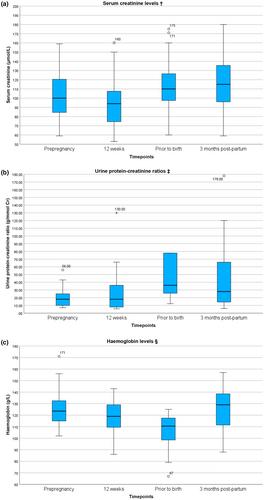Pregnancy in kidney transplant recipients has become increasingly common. However, pregnancy carries higher risks to these patients compared to the general population.
To describe pregnancy outcomes in kidney transplant recipients.
We conducted a single-centre retrospective cohort study of kidney transplant recipients who delivered after 20 weeks gestation at a quaternary hospital in Victoria, Australia, between 2000 and 2022 inclusive.
The study included 37 pregnancies from 27 patients, accounting for 38 infants. Over half of recorded pregnancies occurred in the past five years (56.8%, n = 21). There were high rates of pre-existing hypertension (75.7%, n = 28). Pregnancy-induced hypertension and pre-eclampsia were common antenatal complications (21.6%, n = 8 and 48.6%, n = 18 respectively). Soluble fms-like tyrosine kinase-1 / placental growth factor ratios were elevated in all patients who developed severe pre-eclampsia (16.2%, n = 6). The median gestational age at birth was 36.4 weeks (range 20–40.4, Q1 32.9, Q3 37.6) and 59.5% (n = 22) of births were preterm. Unplanned caesarean without labour was the most common mode of birth (35.1%, n = 13). The overall caesarean rate was 62.1% (n = 23). Post-partum haemorrhage complicated over half of pregnancies (56.8%, n = 21). Fifty percent (n = 19) of infants were admitted for neonatal care, in particular neonatal intensive care, and had low birthweights under 2500 g. While there was a transient deterioration in kidney function, there was no graft rejection within one year of birth.
Clinicians should consider the high rates of pre-existing hypertension, preterm birth, and caesarean birth when counselling and managing pregnant kidney transplant recipients.



